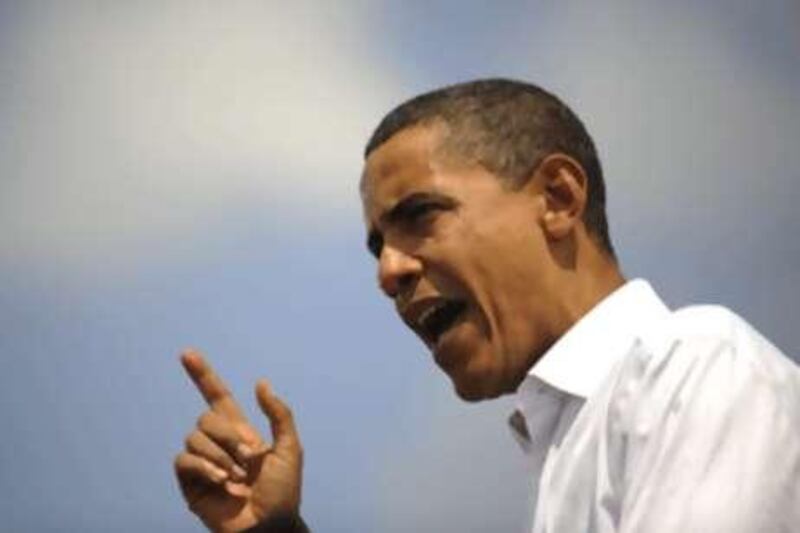Just 40 days from the US general election, the fast-moving financial crisis has transformed the White House race into a daring duel of political brinkmanship between John McCain and Barack Obama. It was a compelling day of political bluff and counter-bluff yesterday, with each of the rivals trying to show the steady nerve, on-the-fly strategising and leadership aura worthy of a president. Sinking in the polls as his Democratic rival capitalises on the economic anxiety sweeping the United States, Mr McCain pulled off a sudden and daring manoeuvre, suspending his campaign and challenging Mr Obama to do the same. But Mr Obama refused to take the bait, rejecting the Republican champion's call to delay their crucial first presidential debate on Friday with a withering rebuke to Mr McCain that presidents must deal with "more than one thing at once." George W Bush warned in a nationally televised address late yesterday of a "long and painful recession" unless immediate action was taken. The president also persuaded Mr Obama and Mr McCain to meet him, along with top congressional players in Washington on today. The historic White House "summit" may provide the political cover each side needs to pass a financial rescue deal through Congress, for which both will no doubt claim a large slice of the credit. Mr McCain had watched his poll numbers steadily decrease in recent days, and commentators said he knew a bold move was needed to stop the election slipping away after leaving a poor impression during a week of economic slippage. In a sudden press conference in a New York hotel, the 72-year-old Arizona senator announced gravely that he had put his White House campaign on hold, and would return to Washington to search for a solution to the crisis. "We must meet as Americans, not as Democrats or Republicans, and we must meet until this crisis is resolved," Mr McCain said. The campaign said the move was motivated by a realisation that nothing was going to get done in Washington without the politicians with the most to lose, or gain, from a solution getting involved. "There was no consensus being arrived at. McCain is putting chips on the table," one aide to the Republican said. Mr McCain's abrupt declaration seemed to catch the Obama camp off guard. But the Illinois senator was soon back in the game and raising the stakes significantly. He rejected Mr McCain's call to return to Washington and dismissed his demand that the debate be delayed until a bailout package is framed. "It's my belief that this is exactly the time when the American people need to hear from the person who, in approximately 40 days, will be responsible for dealing with this mess." Mr McCain will likely not be able to sidestep Mr Obama attacks designed to saddle him squarely with Mr Bush's legacy and blame eight years of Republican leadership for the crisis. Both Mr Obama and Mr McCain also have a political interest in being seen to reluctantly embrace the US$700bn (about Dh2.5trillion) bailout package levied by the US treasury secretary Henry Paulson. Though many analysts and people in both campaigns deem it vital to staving off a financial disaster, the package seems to be widely unpopular in battleground states which hold the fate of the White House race. The spectacle of Wall Street tycoons profiting from a taxpayer bailout could be a political dampener in states like Ohio and economically stretched Michigan. While Mr Obama agreed to the White House summit, his fellow Democrats lashed out at Mr McCain, trying to ensure that blame for the crisis sparked by piles of bad debts, remains squarely attached to Bush's Republicans. "With polls showing his campaign is at its weakest, Senator McCain's decision may have less to do with the drop in the Dow Jones average and more to do with a decline in the Gallup poll," said Mr Obama ally Senator Dick Durbin. New polls meanwhile suggested a possible Obama surge and that he was profiting from the crisis. The Washington Post/ABC poll gave Mr Obama a 52 per cent to 43 per cent lead. He was up 45 to 39 in a Fox News/Opinion Dynamics survey, but another poll by NBC News and The Wall Street Journal put the gap at only two points. *AFP
Debate in doubt amid 'bailout' posturing
The fast-moving financial crisis has transformed the White House race into a daring duel of political brinkmanship between John McCain and Barack Obama.

More from the national





